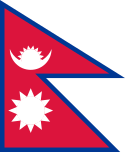Małe Himalaje
 Widok na Małe Himalaje, w głębi widoczne ośnieżone Himalaje Wysokie, Tansen | |
| Kontynent | |
|---|---|
| Państwo | |
| Jednostka dominująca | |
| Sąsiednie pasma | |
| 28°45′N 83°30′E/28,750000 83,500000 | |
Małe Himalaje[2] (ang. Lower Himalayas, urdu: چهُوٹـَا هِمَالـَيَه, hindi: लघु हिमालय, nep. तल्लो हिमाल, dzongkha: གངས་རི ཆུང་ངུ) – fragment pasma Himalajów. Nazwą tą określa się kilka niezależnych pasm górskich położonych pomiędzy Himalajami Wysokimi a Himalajami Zewnętrznymi[1], oddzielonych od nich dużymi kotlinami, np. Kotliną Katmandu.
Do Małych Himalajów należą, poczynając od zachodu: Pir Pandźal, Dhauladhar, Nag Tibba i nepalski Mahabharat. Najwyższe szczyty przekraczają 5000 m n.p.m., średnia wysokość regionu wynosi 3700 – 4500 m n.p.m.[1]. Małe Himalaje tworzą skały magmowe i skały metamorficzne, a także w dużym stopniu skały osadowe.
Przypisy
- ↑ a b c Lesser Himalayas, [w:] Encyclopædia Britannica [online] [dostęp 2016-03-15] (ang.).
- ↑ Nazewnictwo Geograficzne Świata. Zeszyt 4. Komisja Standaryzacji Nazw Geograficznych, 2004, s. 65. ISBN 83-239-9018-2. (pol.).
Media użyte na tej stronie
The Flag of India. The colours are saffron, white and green. The navy blue wheel in the center of the flag has a diameter approximately the width of the white band and is called Ashoka's Dharma Chakra, with 24 spokes (after Ashoka, the Great). Each spoke depicts one hour of the day, portraying the prevalence of righteousness all 24 hours of it.
Black up-pointing triangle ▲, U+25B2 from Unicode-Block Geometric Shapes (25A0–25FF)
Autor: Uwe Dedering, Licencja: CC BY-SA 3.0
Relief Location map of Asia.
- Projection: Lambert azimuthal equal-area projection.
- Area of interest:
- N: 90.0° N
- S: -10.0° N
- W: 45.0° E
- E: 145.0° E
- Projection center:
- NS: 40.0° N
- WE: 95.0° E
- GMT projection: -JA95/50/20.0c
- GMT region: -R45.70461034279053/-25.193892806246794/-158.9850042825966/36.990936559512505r
- GMT region for grdcut: -R-20.0/-26.0/205.0/90.0r
- Relief: SRTM30plus.
- Made with Natural Earth. Free vector and raster map data @ naturalearthdata.com.
Autor: Vyacheslav Argenberg, Licencja: CC BY 2.0
The Mahabharat Range (Lesser Himalaya) at Tansen, Palpa District, Nepal. In the background the Greater Himalaya (snow and clouds)







